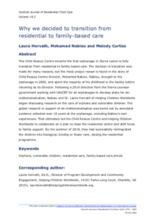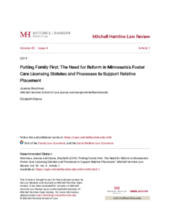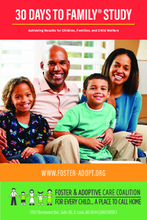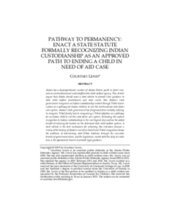Displaying 211 - 220 of 608
This paper from the Scottish Journal of Residential Child Care outlines the Child Rescue Centre's process of transitioning from residential care to family-based care in Sierra Leone.
This article tracks the history of foster care licensing requirements in the U.S. state of Minnesota, discusses the real-life story of a grandmother with a grandchild placed in foster care, explains the federal mandates established through the Adam Walsh Act, discusses the existing flaws in the process, and highlights the ways in which Minnesota’s current statutory scheme and processes disproportionally impact communities of color.
This brief from the Foster & Adoptive Care Coalition in the United States provides an overview of the 30 Days to Family® program in the U.S. state of Missouri, an intense, short-term intervention developed by the Foster & Adoptive Care Coalition to: 1) increase the number of children placed with relatives/kin at the time they enter the foster care system; and 2) ensure natural and community supports are in place to promote stability for the child.
The objective of this paper is to examine the situation of orphans and vulnerable children (OVC) in Dar es Salaam, Tanzania in existing alternative care systems and explore the treatment of OVC in these systems.
This article argues that the US state of Alaska should enact a state statute to provide clear guidance to state child welfare practitioners and state courts that Alaska’s state government recognizes an Indian custodianship created through Tribal law or custom as a pathway for Indian children to exit the overburdened state foster care system.
This article reports a research study in Victoria, Australia, that explored nonfamilial kinship care through analysis of administrative data, interviews with young people and carers, and focus groups with kinship care support workers.
This study investigates the difference in the well-being of children in kinship care when compared to children in other care settings within Africa, examining factors that are associated with their well-being outcomes.
This chapter from the Handbook of Parenting and Child Development Across the Lifespan explores five domains of research connecting social support and parenting: (1) intergenerational transmission of parenting; (2) community and neighborhood; (3) marriage quality; (4) grandmothers; and (5) offline and online friends.
This study sought to investigate associations of caregiver-child closeness, monitoring, and dating communication with youth's sexual initiation, sexual partners, and unprotected intercourse over the subsequent 12 months.
Although the extant literature provides rough estimates of the number and characteristics of children living in most care arrangements, research on kinship probate guardianship is especially scarce. This article focuses on kinship probate guardianship in an effort to build the literature on this understudied population.




